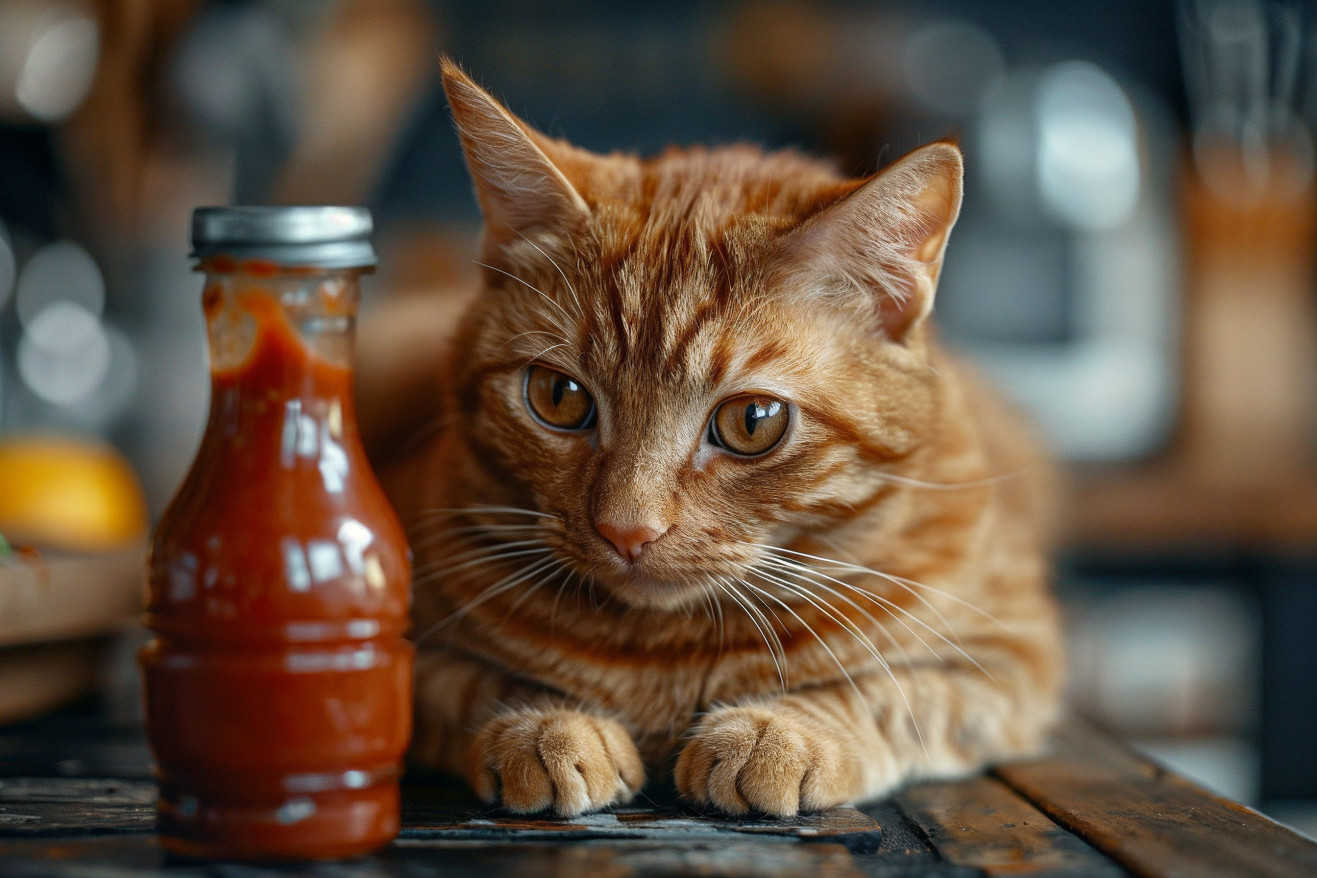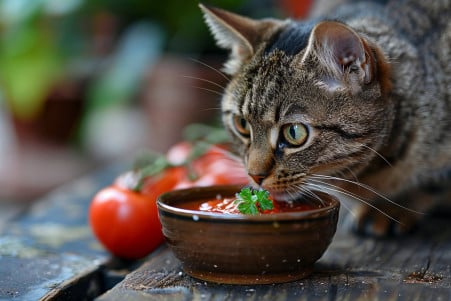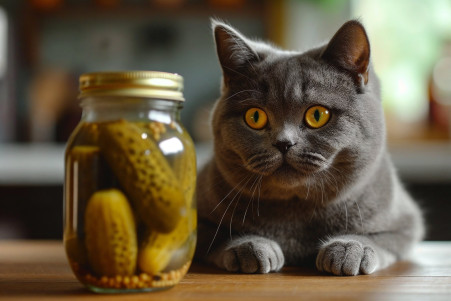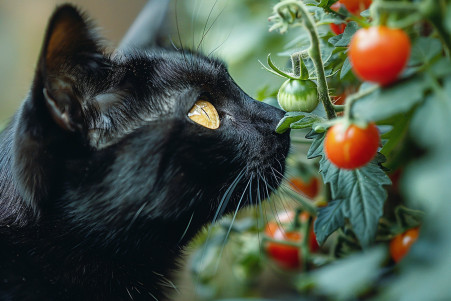Can Cats Eat Ketchup? Exploring Safe Foods for Felines
10 April 2024 • Updated 8 April 2024

Cats have very different nutritional needs than humans, so can these furry friends safely indulge in condiments like ketchup that are common in our diets? No, cats should not eat ketchup. Ketchup contains several ingredients that are unhealthy or even toxic for cats, including sugar, garlic, onions, and vinegar. While a small lick likely won't harm them, regularly feeding ketchup to cats can lead to gastrointestinal upset, anemia, and other health issues.
While ketchup is clearly off the menu, we'll explore the research behind why so many everyday human foods can be dangerous or toxic for cats. By understanding their unique nutritional requirements and the risks posed by certain ingredients, you can ensure your feline friend maintains optimal health through an appropriate diet. We'll look at scientific studies on cat nutrition, as well as expert guidance from veterinarians, to provide comprehensive insights into which foods cats can and cannot safely consume.
Can cats eat ketchup?
Harmful Ingredients in Ketchup: Why It's Bad for Cats
There are several ingredients in ketchup that can be dangerous or even toxic to cats because of their specific dietary needs. One of the most worrisome is the presence of onion and garlic powder, which CatTime notes can cause a type of anemia called Heinz body anemia in cats, a condition that can be life-threatening. These ingredients cause a cat's red blood cells to be damaged and then rupture.
Ketchup's high sugar content is another problem. RAWZ points out that sugar can lead to obesity, dental problems like cavities, and an increased risk of diabetes. Cats don't need sugar in their diets.
The sodium in ketchup is also bad for cats. The Daily Paws explains that too much salt can cause dehydration and electrolyte imbalances, which can be life-threatening. Cats need a specific balance of nutrients, and added salt is not part of that.
In addition, vinegar and preservatives found in ketchup can be irritating to a cat's digestive system, according to Dr. Karen Becker as cited by Mercola Healthy Pets. It's a good idea to avoid feeding cats any human foods that contain ingredients that could be toxic or harmful to their unique biology and dietary needs. A balanced, species-appropriate diet is essential to a cat's health.
More Human Foods That Are Bad for Cats
In addition to the potential risks of giving cats ketchup, there are many other human foods that are toxic or harmful to cats. The Humane Society lists chocolate, alcohol, grapes, raisins, and caffeine as things that can cause poisoning or neurological problems in cats. Even a small amount of these foods can be deadly.
Cats are also at risk from raw meat, eggs, and fish, which can carry bacteria like Salmonella and E. coli that can cause illness, as noted by WebMD. Dairy products, nuts, and avocados can cause digestive upset or other health problems for cats, according to Cats Protection.
Knowing which human foods are safe and which should be off-limits is important for responsible pet ownership and your cat's overall health and wellness. The best way to make sure your cat is getting what they need is to stick to their dietary requirements.
What to Do If Your Cat Eats Ketchup
If a cat has ingested a large amount of ketchup, they may exhibit symptoms such as stomach upset, loss of appetite, diarrhea, and dilated pupils, per wikiHow. If any of these symptoms are noticed after a cat has eaten ketchup, the cat owner should contact a vet immediately.
If poisoning is suspected, wikiHow advises moving the cat to a well-ventilated area and calling a vet or poison control center for further instructions. The substance that was ingested, in this case ketchup, should be identified to help determine the proper course of action, which may include inducing vomiting or giving the cat activated charcoal, as recommended by JustAnswer.
It's important to note that some home remedies can be dangerous, so it's important to follow the advice of the vet or poison control center. According to Catster, some of the ingredients in ketchup, such as garlic and onion powder, can cause serious conditions such as Heinz body anemia in cats. Therefore, it's important to seek medical attention if a cat eats ketchup or shows signs of poisoning.
Healthy Alternatives to Ketchup for Cats
Although ketchup and many other human foods are not safe for cats, there are some healthy treat options. Pet Care Studio says that small amounts of cooked lean meats, canned fish (without sauces), and plain yogurt can be used as treats. In addition, Home Alive says that cats can eat certain fruits and vegetables like bananas, apples, carrots, and broccoli in moderation.
When it comes to treats, commercial cat treats that are specifically made for cats are a better option than human foods because they are made to meet a cat's nutritional needs. Home Alive also says that treats should only make up a small part of a cat's diet, with the majority of their diet coming from a high-quality, meat-based cat food.
To be a responsible pet owner, it's important to make sure that you're looking out for your cat's best interests by feeding them a well-balanced, species-appropriate diet and avoiding human foods that could be harmful to them.
Conclusion: Make Sure You're Prioritizing Your Cat's Health and Well-Being
Because of the unique nutritional needs of cats, many common human foods, including ketchup, can be harmful or even toxic to them. The presence of onions, garlic, sugar, and high sodium levels in ketchup can cause a variety of health problems in cats.
It's important to know which foods are safe and which are dangerous for your cat to eat. If your cat does consume a toxic substance like ketchup, it's important to get them to a vet right away and follow their advice. Making sure you're prioritizing your cat's health and well-being by feeding them a balanced, meat-based diet and avoiding potentially harmful human foods is an important part of being a responsible pet owner.


